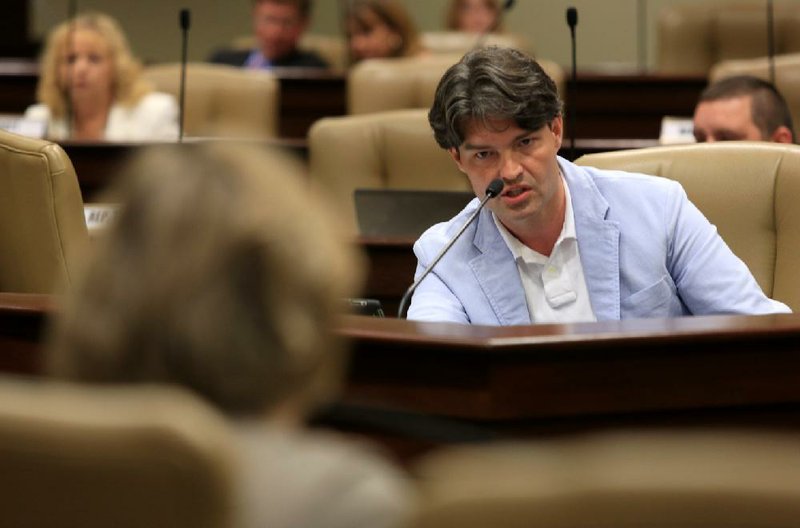State lawmakers on Wednesday pushed parole administrators to explain why a “temporary” policy that allowed parolees to serve out their parole terms even after absconding from the system has remained in effect for the past six years.
The policy, set forth in an April 2007 state Board of Parole memorandum and brought up during a legislative review last week, did not freeze the time left on a parolee’s sentence of supervision when the parolee absconded. Instead, it allowed parole violators to clear the system even while they were evading parole authorities, a practice that several lawmakers as well as parole officials agreed Wednesday did not serve the safety of the public.
Sen. David Sanders, R-Little Rock, pointed out that a 2007 Arkansas Democrat-Gazette story quoted G. David Guntharp, then director of the Department of Community Correction, calling the policy a one-time fix meant to purge old parole records and saying it wouldn’t last longer then 60 days.
RELATED ARTICLE
http://www.arkansas…">Drug dilemma spurs debate: Still execute?
Six years later, during a joint meeting of the state Senate and House judiciary committees Wednesday, Sanders wanted to know why the policy was still in place.
The policy, adopted by a former head of the Parole Board, Leroy Brownlee, and executed by Guntharp, should have drawn the attention of the Board of Corrections, to which the Community Correction Department reports, as well as the Parole Board, Sanders said.
But also, he said, the policy should have been addressed by officials at the Community Correction Department, mainly, Dan Roberts, who has been the deputy director of the agency’s parole and probation operations since before the policy went into effect.
At the committee meeting, Roberts said he was never told that the policy spelled out in the April 2007 memo was “temporary,” despite accounts of what Brownlee and Guntharp said about the policy that appeared in the newspaper.
“Did you recall ever going up the chain suggesting [the policy be reversed]?” Sanders asked.
“I did not address it, no, sir,” Roberts said.
“Do you think you should have done that?” Sanders asked.
“I probably should have. I should have checked on it. … I did not,” Roberts said.
Roberts, as well as Sheila Sharp, interim director of the Community Correction Department, said the old policy has been “unofficially” reversed and that they are waiting on the Parole Board to officially reverse it at their Thursday meeting.
Sen. Eddie Joe Williams, R-Cabot, said that by continuing a policy that he thought ran contrary to the agency’s interest in protecting the public, parole officials invited the appearance that they were “juicing the numbers,” allowing parolees to move through the system, thereby falsely enhancing the agency’s own performance.
“You said, looking back, it would have been the right thing to do to stop that,” Williams said. “But to continue doing, it’s artificially moving some numbers around … and it’s that purpose that concerns me.”
Roberts said the practice, for him, was never a numbers game and that he was never notified to break from the policy.
“It was no intention to make any numbers look better, on my part or anyone who works for me,” Roberts said.
Williams went on to say that he was worried about the message that this policy, as well as other deficiencies discussed in the meeting and prior legislative meetings reviewing the state’s parole system, sent to voters.
“The attorney general has said [the state’s capital punishment system is] in such disarray that we can’t even execute someone, and then all these [parole] issues out there, there’s a perception out there in the general public that we’ve somewhat become soft on crime,” Williams said. “I think we’ve got some work to do to amend that.”
Mary Parker, vice chairman of the Board of Corrections, said her board and Sharp are doing just that.
Since a June 17 story in the Democrat-Gazette highlighting the case of Darrell Dennis, an eight-time parole absconder who wasn’t sent back to prison until after his May 22 arrest in a Little Rock kidnapping and murder, Parker said, the board has crafted several new policies specific to the “deficiencies” in the Community Correction Department’s handling of the Dennis case as pointed out in the news story.
One such policy, Parker said, would require parole officers to seek to hold a parolee who is awaiting a revocation hearing. Another policy would require a revocation hearing for a parolee charged in any new felony, as opposed to just violent or sexual felonies.
The day the Dennis case was featured in the newspaper, Gov. Mike Beebe met with the former director of the Community Correction Department, David Eberhard, and later announced his office was conducting its own investigation into the Dennis case as well as problems in the parole system at large.
A few days later, state police began their own investigation, as did the Corrections Board and several legislative committees. Those committees have discussed possible solutions, ranging from more funding, more prison space, stiffer penalties for parole violators and better cooperation between law enforcement and parole officials.
Sharp, who took over after Eberhard retired on July 1, has said she plans to submit a comprehensive proposal of new policies and procedures, as well as structural changes at her agency to the Board of Corrections.
Echoing concerns from Sanders and Williams, Sen. Jeremy Hutchinson, R-Little Rock, chairman of the Senate’s Judiciary Committee, said he was worried about mission drift within the agency.
“You try to look efficient, whether it be the definition of recidivism, whether it be the absconders and the clock running out or calling parolees ‘clients’ … your mission was not to protect the [public] safety but make [the organization] look good,” Hutchinson said. “I do think complacency sets in. Let’s just move these things along, keep the paperwork flowing, that is, not just y’all, it’s human being, all of us are susceptible to that. … We need something that prevents that human nature from setting in.”
Sharp said that one of her first acts as interim director was sending out an email emphasizing public safety is her agency’s mission.
Sharp said that area managers need to boost their communication with local law enforcement, jail officials and prosecutors, and said that the agency’s “matrix,” the guidelines for discipline actions for parole violators, contains steps that will make sure a troublesome parolee won’t “fall through the crack.”
Parker, the Corrections Board vice chairman, said that Sharp has done a good job so far of engaging parole officers at the ground level about what the agency needs to improve on and what they need to drop, a dialogue she said was lacking in past leadership.
Sanders also commended Sharp for “bending over backwards” to reach out to employees and assure them that any who speak out won’t be retaliated against. But he said he was worried that the Board of Corrections didn’t share the same mission as Sharp.
According to Sanders, there are several parole officers who are afraid to cooperate fully with the many ongoing investigations of the Parole Board because they are afraid of retribution, either in the form of an undue burden of more “problem” cases or other actions from managers.
“There are some who will not [cooperate] because they have no assurances whatsoever that the information given by them to the [Corrections Board] will not be used against them at some point,” Sanders said.
Parker said the Correction Board’s chairman, Benny Magness, sent a memo out early in the board’s investigation assuring that employees looking to speak out would be met with no retribution.
She also said that the speed with which the board moved to appoint Sharp as interim head was a positive sign to those worried about running afoul of some administrators.
“We will reach out and continue to reach out to every employee … to make sure they have the comfort level that they can bring forth the information … so we can have a functioning, positive organizational relationship,” Parker said. “Bringing Sheila on and her management style is helping tremendously. We’ve regained some trust that was lost.”
Front Section, Pages 1 on 07/25/2013


